| Reviews & Columns |
|
Reviews DVD TV on DVD Blu-ray 4K UHD International DVDs In Theaters Reviews by Studio Video Games Features Collector Series DVDs Easter Egg Database Interviews DVD Talk Radio Feature Articles Columns Anime Talk DVD Savant Horror DVDs The M.O.D. Squad Art House HD Talk Silent DVD
|
DVD Talk Forum |
|
|
| Resources |
|
DVD Price Search Customer Service #'s RCE Info Links |
|
Columns
|
|
|
Helen Mirren at the BBC
BBC Video has released a rather astonishing five-disc boxed set, Helen Mirren at the BBC, gathering together nine of her televised theatrical productions that aired on the British TV network between 1974 and 1982. No doubt cobbled together because of renewed high-profile interest in the actress (winning the American Best Actress Oscar is still the all-time publicity coup for performers), Helen Mirren at the BBC gives fans of the highly talented thespian an unusual chance to see her in her more formative years. It's doubtful these theatrical plays, produced specifically for the BBC to be broadcast on television, would have seen these shores had Mirren not won the Oscar, so devotees of the actress - as well as anyone interested in the much-neglected (and maligned) "televised play" - would do well to pick up Helen Mirren at the BBC.
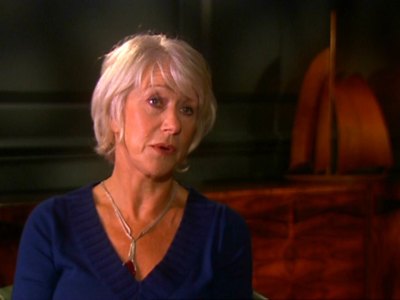
Helen Mirren. It's difficult to nail down exactly her specific appeal. Certainly now, she's just beginning to enter that "grand dame" phase of her career (no doubt influenced by her astounding turn as Queen Elizabeth II in her Oscar-winning role, The Queen) that the media is so found of fostering, and that is so familiar to Western audiences with other highly-respected, well-known British actresses (such as Maggie Smith, Glenda Jackson, Peggy Ashcroft, and Edith Evans before her). But of course, Mirren early in her career stirred independent and international audiences right from the start with her palpable sensuality and unabashed willingness to appear naked on camera and stage (probably culminating, at least for international movie audiences, in 1989's The Cook, The Thief, His Wife & Her Lover, and of course in the various Prime Suspect TV series). Not quite a "classical" beauty (such as Julie Christie), Mirren's initial appeal (one that she says she regrets being pigeonholed into early in her career) came from her ability to project a startling emotional and physical eroticism (no doubt helped by her sensuous body) that was a revelation to staid British theatregoers and viewers who didn't exactly see that quality expressed every day from their up-and-coming classically trained actresses. Emerging in the early-to-mid seventies, Mirren combined the acting chops of England's best-trained actresses, with an almost coarse carnality (think, perhaps, film's Susan George), that has captivated the international art house crowd for over three decades now. It's a potent combination ("art" and sex), and the Helen Mirren at the BBC boxed set gives viewers a chance to see the development of that irresistible amalgamation from the formative years of her career. Let's look at the individual televised plays.
THE CHANGELING
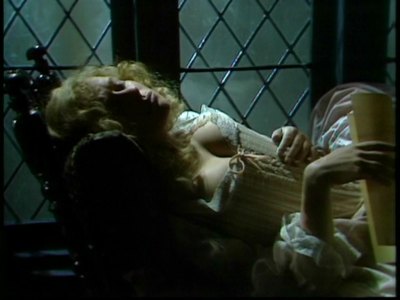
"The Changeling features Helen Mirren in one of her first breakout performances, as tragic heroine Beatrice-Joanna. Betrothed to Lord Alonzo De Piraquo, Beatrice-Joanna finds herself in love with nobleman Alsemero instead. Deciding to take matters into her own hands, Beatrice-Joanna engages the services of villainous De Flores, her father's manservant, to murder Alonzo. Completely smitten with his master's daughter, De Flores eagerly agrees to Beatrice-Joanna's idea. After killing Alonzo, De Flores cuts off the man's finger and presents it to his love. Horrified at what she had done, Beatrice-Joanna realizes too late that De Flores requires her body, not money, as his reward. Before lone, Beatrice-Joanna finds herself involved in a desperate attempt to cover her initial transgression and is forced to confront its consequences." - Liner notes.
Shot on dark, ghostly video in tight, claustrophobic close-ups, with quite a bit of the dialogue heard as voice-over soliloquies, The Changeling immediately illustrates the difference between seeing a play in a theatre, and seeing it broadcast for either film or TV. From her very first shot, director Anthony Page (a well-respected theatrical director - Tony winner for 1997's A Doll's House, as well as frequent TV director, such as The Missiles of October and Middlemarch) is able to come right in close on Mirren's beautifully expressive eyes, which languidly flash and play across Brian Cox's Alsemero, immediately setting the character in her proper attitude of disastrous temptress. You simply can't get that same, intimate effect on the stage, resulting here in a nicely heated adaptation of the venerable Thomas Middleton and William Rowley Jacobean classic. Actors claw and paw at each other in tight close-ups (I love Mirren's expression of disgust and sensuous fear when Stanley Baker's De Flores grabs her face, crushing her sexy mouth), giving the viewer an entirely different experience had the same actors performed the same sequence for the stalls. It's more immediate, more visceral, more intimate, if you will (but by no means "better" - just "different").
Moving quickly, The Changeling, originally broadcast in January of 1974 as part of the BBC's venerable Play of the Month series that ran from 1965-1983, benefits enormously from the subdued power of Stanley Baker's De Flores, even though one may suggest he's slightly miscast (it's difficult to believe all of Mirren's protestations of De Flores' physical ugliness when viewing the rugged, handsome Baker). Mirren is requisitely carnal and scheming (with a penchant at this point in her career to still "go over" in several moments), but Brian Cox is bit of a cipher here as Alsemero, producing none of the spark or sexuality that would convince us that Beatrice-Joanna would actually plot to kill for him. Page's decision to have quite a bit of the dialogue heard in voice-overs is a perfectly acceptable and time-honored technique for filmed plays, and detracts in no way from the overall effectiveness of the piece (if anything, it allows us to study more intently the faces of the actors as they plot their machinations, while listening to the glorious Rowley/Middleton language). A divergent dream sequence, reminiscent of all that mid-seventies modern dance twaddle, is a mistake, but overall, this tightly focused revenge drama is cleanly effective for the small screen.
THE APPLE CART
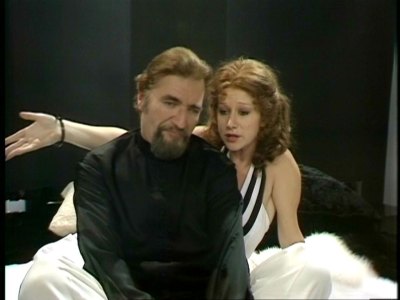
"In Bernard Shaw's 1929 play, set forty years in the future, the king must match wits with an unruly mistress and a cabinet seeking to transform the nation into a constitutional monarchy. Over the course of the two acts and interlude, he navigates a series of political challenges and verbally spars with his mistress Orinthia, played by Helen Mirren. Mirren's Orinthia is pampered, devastatingly beautiful, and every bit the intellectual match of her royal lover. Even though she doesn't appear until after the first act, Mirren more than makes up for her earlier absence with a drawing room scene that can be considered the highlight of the play." - Liner notes.
A spirited adaptation of Shaw's The Apple Cart, which met with largely negative notices from critics and lovers of Shaw when it premiered in 1929 (who narrowly accused Shaw of turning into a defender of royalism at the expense of democracy), this 1975 production by director Cedric Messina (a veteran TV producer and director of theatrical plays) is a fascinating battle of political wits, interrupted by a more familiar Shavian interlude of a battle of sexual wits between a king and his royal lover. Headed up by Nigel Davenport (where is that terrific actor lately?), The Apple Cart is an amusing round-robin of opposing theoretical maneuverings that has more to do with the politics of personality rather than the politics of politics. Davenport's King Magnus, pushed into a corner of seemingly irreversible powerlessness when his popular (but largely ineffective) ministers demand he give up his last royal powers - the power of the kingly veto and the ability to criticize the Parliament's efforts in the press - the King comes up with a neat solution to his problem: threatening to reject his "god-given" royalist powers in service of the very democracy he opposes, and by abdicating his throne and running as Prime Minister. It's a fascinating treatise on both democracy and royalism in opposition to plutocracy (everyone is aware that they're essentially controlled by the overpowering money-makers) that, although rooted in a framework that may not be entirely familiar to American audiences, quickly becomes rewarding in its universality.
Davenport is almost feline in his delight in the role, rolling the Shavian dialogue off his tongue with an authority and playfulness that's entirely keeping with the character. Mirren, in her celebrated "interlude" with the King, that breaks up the two main acts, isn't as successful with her interpretation of the sexually charged, highly intelligent - and altogether too demanding - consort of the King, who incorrectly assumes he will give up everything he's learned about being the people's monarch, just to call her his own. Mirren is obviously trying too hard here to be sexualized and alluring and enticing, coming off often as a very naughty, very attractive, attention-seeking girl at a party, rather than a Shavian equal to her verbally sparring King. Her "defeat" is all too predictable by Davenport, because she's so obviously overdrawn in her attempts to secure the King for herself. The production itself, which is rather straightforward in its lensing (I could have done without the repeated overhead shots of Mirren on her bed), looks quite handsome in its 1975 approximation of "modern," although those who don't keep the play in its proper context - forever in the future - may see this production design as a drawback. Witty, fascinating in its thrust and parry of opposing political and personality theories, The Apple Cart is one of the more interesting offerings here in the Helen Mirren at the BBC boxed set.
CAESAR AND CLARETTA
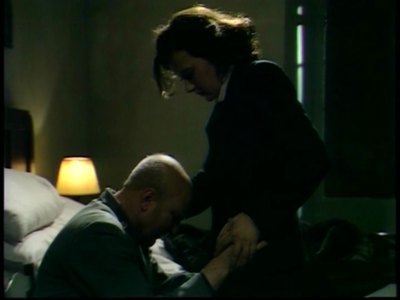
"Robert Hardy and Helen Mirren star as Benito Mussolini and his lover Claretta Petacci in this dramatization of their last night together, locked in a small peasant cottage. Having admired Mussolini since she was a schoolgirl, Claretta finally had a chance to meet the Italian leader at the age of 24. For the next 10 years she was Mussolini's official mistress, and was the only woman with him when they and a group of supporters were captured by Communist partisans during an escape attempt. On April 28, 1945, Mussolini and Petacci were shot by their captors. Even though Claretta was offered her freedom, she refused to leave her lover, a touching declaration of a woman's love despite the dubious reputation of the object of her affections." - Liner notes.
Certainly the least effective offering here in the Helen Mirren at the BBC boxed set, this frankly ridiculous 1975 TV production is misguided from the get-go. Why anyone (particularly the author of the original play, Jack Russell) would believe that audiences would want a largely sympathetic treatise on the final night of brutal dictator Benito Mussolini is beyond me, but at the very least, couldn't Russell have given some kind of context for the vapid whinings and mewlings that pass for "insight" here? Am I truly supposedly to feel sorry for poor Benito's impotence - both spiritual and physical - while his lover Claretta enjoins him to "rise" above it all? It's a laughable premise, particularly when Russell offers absolutely no context whatsoever for Benito's crimes against humanity, nor any particularly deep or meaningful grounding for his relationship with Claretta. Opening and closing newsreel footage is, I assume, supposed to root this vapid little farrago in some kind of reality, but images of Benito and Claretta dead at the end of the film don't exactly inspire sympathy or pity...or anything for that matter, because we don't know what the hell Russell is trying to get at here.
Further compounding the problem is the hysterically bad casting of jovial, bemused Robert Hardy as Il Duce, a ridiculous bit of stunt casting that utterly fails to convince viewers that we're watching the strutting, preening, but now emotionally crushed Italian dictator. In the central scene that brought me to ever-building giggles, Hardy tries to goad on his, um...little duce one last time with his lover, recalling a previous encounter with a farm woman, shouting out the joys of this earthy coupling, while Mirren enthuses, "Il Duce! Il Duce!" It's a priceless bit of camp, totally unconvincing, and perfectly indicative of the unintentional humor of the piece. Mirren, who looks good in the period lingerie and who has little to do here in this slight, 49-minute outing, offers the only bright spot in the play when she quite selflessly bares her breasts during the love scene. Thank goodness for large favors.
THE PHILANTHROPIST
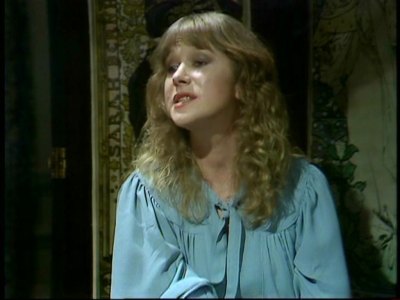
"This play by Christopher Hampton (Les Liasons Dangereuse) offers witty dialogue in the midst of remarkable conflict among its well-heeled characters. Philip, his fiancee Celia (Mirren), and their circle of friends talk philogy, playwriting and everything in between during the course of a dinner party. Despite the fact that seismic events are unfolding in the world around them, their conversation turns to the usual. Strangely enough, news of the collapse of the government and its violent aftermath doesn't perturb anyone, although a hit list from an organization called F.A.T.A.L. targeting 'twenty-five of the most eminent English writers' does elicit a slight reaction from dinner guest and novelist Braham Head, who isn't sure whether to be 'relieved or insulted' not to find himself on the list. However, despite the reactions (or lack thereof) to outside events, the party is not without drama of its own. As the evening progresses, couples form and love blooms...just not in the expected ways." - Liner notes.
Written by Christopher Hampton (Atonement, The Good Father, Dangerous Liasons), The Philanthropist fits right in with Hampton's oeuvre of ironic, devastatingly funny put-downs of the human condition, certainly more in tune with the likes of a precisely-worded cynic like Flaubert rather than more oblique modern jousters like Stoppard and Pinter. In The Philanthropist, Hampton turns Moliere's The Misanthrope on its ear, creating in Philogy professor Philip (Ronald Pickup) a man desperate to cause no offense - even if it means sleeping with another woman he doesn't even find attractive - while all around him, friends and acquaintances act beastly towards each other. Criticism can be helpful, but only if it's negative (the opening sequence where Philip's praise of a new playwright is rejected in favor of Philip's friend Don's acid dismissal, nicely sets the stage for Hampton's inverted world view). And inaction and indecision are merely sidelines for professional academics like Don and Philip (Don boasts about emptying his mind of everything for hours at time), who are so removed from the reality of the world they pass judgment on, they can't be bothered to see that Britain's government has been brought down with one feel swoop of an assassin's machine gun, and that armed revolutionaries are seeking out the very men who provide the grist for Don and Philip's academic and professional mill.
Here, with Hampton's reference to the F.A.T.A.L. group ("Fellowship of Allied Terrorists Against Literature"), The Philanthropist threatens to veer off course, but luckily, nothing more is made of this obvious schematic; the directness of his writing and the obviously bemused scorn in which he piles on the hapless Philip, the scheming, opportunistic layabout Don, and the facile, worthless Braham (Charles Gray, terrific), are more than enough to sustain the play without an added emphasis of this subplot byproduct. Unfortunately, fans of Mirren won't find much to recommend her performance here. Whether the part is underwritten to start with, or there's Mirren's lack of command of the role (something she alludes to in an interview included as an extra here), her Celia is the least memorable character in the play, merely acting as a sounding board for Philip's eternal waffling and ameliorations. Directed by TV veteran Stuart Burge, he tries some linking montages made up of still photographs (that doesn't work), but he's assured enough to sit back and let the actors run with the material, making for a bitchy, thoughtful work of terribly funny put-downs and nervously apprehensive contemplation for those who might find a little bit of themselves among these genuinely awful (and all too routine) people.
THE LITTLE MINISTER
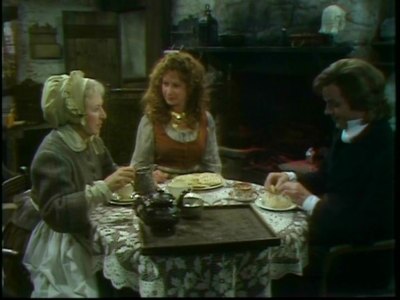
"In this adaptation of the J.M. Barrie novel, Helen Mirren plays Babbie, a mysterious young gypsy girl who incites a Luddie riot in rural 1840s Scotland. Drawn into this even is Gavin Dishart, the new "little minister" of Thrums's Auld Licht church who accidentally happens upon the riot. The unlikely pair fall in love. But before the two can declare their love, they must overcome her secret, Gavin's bond to his religious beliefs, and worst of all, Gavin's devotion to his mother's sensibilities." - Liner notes.
Based on the 1891 novel by J. M. Barrie (of course, of Peter Pan fame), this particularly spirited adaptation of The Little Minister has absolutely nothing to do with class conflict or British rule over Scotland, which merely serve as the plot underpinnings for the whimsical, farcical love story between Babbie, the "gypsy" woman in disguise, and the feckless, naive boy minister, Reverend Gavin Dishart. Indeed, Barrie's novel (which he years later adapted into a play), was concerned primarily with presenting the public with a lighthearted look at a Scotland that had very little to do with reality (this was one of Barrie's first novels, and was written to establish himself as a successful writer, not a social critic). Love's misadventures are the focus of The Little Minister, and the centuries-old dramatic gimmick of concealed identities and convoluted, comical misunderstandings resulting from those secret disguises provide the framework for the familiar but highly effective and amusing tale.
For the Helen Mirren at the BBC boxed set, this is the first offering that features on-location shooting, and even though this 1975 feature was still shot on less-than-stellar video, the location work is a definite plus here (by director Cedric Messina again), giving The Little Minister a much needed boost pictorially, while allowing plenty of space for the actors to ham it up ever so slightly. The supporting cast is first rate (Peter Barkworth is letter-perfect as the seemingly in control, but ultimately fooled Earl of Rintoul, while Bill Simpson is quite funny as Scot Rob Dow), with the two leads perfectly suited to their characters. Ian Oglivy is often hilarious as the nervous, harried, out-of-his-depth Reverend, getting the naivete and the eventual resolve of the character down pat, while Mirren finally shines (at least in this collection) in a straight-ahead comedy that is uniquely suited to her talents. Not afraid to whoop it up a bit (watch her almost go for a pratfall when she's having tea with the Reverend), Mirren is delightfully loose and free and sexy here, her hair dyed red in a glorious mass of curls. She's appropriately impish and naughty as the rabble-rousing Babbie, and equally tentative and downright scared when she realizes what marriage to the Reverend might mean to her freedom and rebellious nature. Together, Oglivy and Mirren are a delight, and provide much of the speed and sure-footedness of this charming, funny, light outing.
THE COUNTRY WIFE
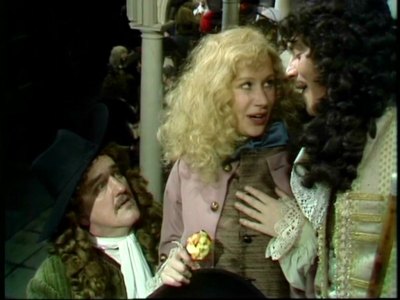
"Horner, a first-class rake, devises a brilliant scheme to lure in the fine married ladies of London society under their husbands' noses. But Horner soon meets his match when he becomes involved with Margery Pinchwife (Mirren), an innocent newlywed from the country. The Country Wife is filled with the wit and humor that are typical of Restoration comedy, and it is considered one of the best from that period." - Liner notes.
The absolute "go-to" text for theatre profs when they want to shake up their provincial little students, The Country Wife is a highly energetic adaptation of William Wycherley's masterpiece, directed by Donald McWhinnie (a vet director of TV plays who was also nominated for a Tony for his direction of Pinter's The Caretaker), and starring the delightful Anthony Andrews as that most delightfully horny of literary horndogs, Horner. Still as much raunchy fun as it was over three hundred years ago, The Country Wife may just now seem a tad tame to some modern viewers because of the aesthetically empty filth that has filtered down into the mainstream popular culture, but most assuredly, The Country Wife still delights because it's such expertly mounted (sorry) filth, written in a deliciously tricky, double-entendre manner with an all-important foundation of social criticism (just listen to all the advice on marriage in it, and see if it doesn't puncture a million holes in the self-help nonsense that's out there today) that gives the viewer something to think about when the laughter subsides.
Wisely keeping the common theatrical gimmick of the characters' asides thrown right out to the audience (used quite often in Restoration comedies because of its furthering of the double-entendre effects), McWhinnie keeps the piece running at a furious pace, never stopping long enough for the viewer to catch his or her breath. And the cast keeps apace, with Andrews a genuine wonder as the irrepressible Horner. Literally wagging his eyebrows and smacking his lips in anticipation of his latest conquest, Andrews is believably roughish and hard underneath - as Horner must be - which gives the laughs a central core of irony and commentary that's necessary to make the piece worthwhile in the first place. The rest of the cast is superior, including an incredible Bernard Cribbins (so great in so many roles) as the furious, beleaguered, sadistically jealous Pinchwife, Michael Cochrane as a hilarious Sparkish (his "Pshaw!" sequence may be the highlight of this adaptation), and a believably randy Adrienne Corri as the hard-up Lady Fidget (her infamous "china scene" with Andrews, played off camera as it is off-stage during a theatrical run, is pitch-perfect). Distressingly, only Mirren fails to sufficiently get into the spirit of this naughty romp, essaying Margery Pinchwife in a most unflattering, desultory manner. One would think her natural propensity for such bawdy characters would ideally suit her here, but evidently (according to the extra interview included here), Restoration comedies are not to her liking, so... And it shows.
BLUE REMEMBERED HILLS
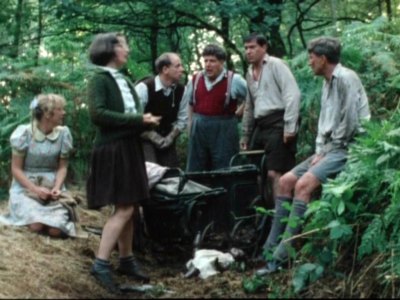
"A made-for-television film by Dennis Potter (The Singing Detective), the title is taken from A.E. Housman's 1896 poem:
Into my heart an air that killsFrom you far country blows.
What are those blue remembered hills?
What spires, what farms are those?
That is the land of lost content.
I see it shining plain.
The happy highways where I went,
And cannot come again.
On a sunny English afternoon in 1943, with the end of World War Ii still two years away, seven children play in the Forest of Dean. However, their innocent and carefree day suddenly turns deadly when a harmless prank goes horribly wrong. This Dennis Potter play is traditionally cast with adult actors as the children, and Helen Mirren fully engages in her character as pigtailed Angela." - Liner notes.
Written by Pennies from Heaven's Dennis Potter, Blue Remembered Hills is a disturbing, nightmarish approximation of early childhood sadism that fails because of its central gimmick: the children are played by adults. Potter is concerned with illuminating the various social and psychological maladies of adult behavior by putting forth that they are present in even the youngest of children, something that some adult viewers certainly won't want to acknowledge (or perhaps not if they think back to their own younger days, or realize that their own children, in a group setting, act quite differently then when under the watchful eyes of adults). Potter is careful to recreate exactly the casual ostracization and pecking orders that groups of children can engage in, as well as the unthinking, casual violence of their behavior. Potter is saying that outside the "civilizing" strictures of the home and family (namely: parents), outside in the wild, children not only revert back to animals at play (and animals at play can be exceedingly cruel), but that their forms of social ordering, bullying, and vengeful punishments meted out for the slightest infraction of the order of group (or for challenging the shifting leaders of the group), are distinctly mimicked after their adult role models (or...they're there from the start, with adults only acting out their childhood dynamics).
Certainly this can logically feed into having the children's roles played by adults, but the concrete nature of filming (as opposed to the sustained "unreality" of a theatre setting, where this kind of experiment can succeed) works against this conceit, saddling Blue Remembered Hills with a fascinating framework, but an ungainly execution. Unless it's contained within a farcical structure, adults acting as children never works in a realistic manner. That may be fine for Potter's experiment - he may indeed want that unreality - but frequently in this adaptation, the simply overacting of the adults ruins any deeper context that may have been brought out. There's simply too much "acting," too much superficial acting exercises going on here ("...and now, Paul, I don't want you to be a tree, I want you to be a...seven-year-old boy! And...begin!") for any of it to have much depth. It's admirable the way director Brian Gibson reinterprets the almost surreal beauty of the surrounding countryside into Potter's Biblical references (the final shot of the wheat field, with the children hiding in terror, reminds me of the Richard Harris "Cain" sequence in John Huston's The Bible), culminating in the only possible ending that could fit after all that has preceded it. But unfortunately, it only takes the mugging of one actor (and they all do it) to interrupt the mood - and the message.
MRS. REINHARDT
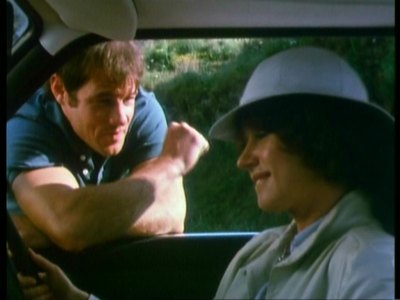
"Helen Mirren stars as the recently separated Mrs. Reinhardt who meets a charming American during her trip to the south of France. Having fled from her adulterous husband with a necklace as the only thing of value, Mrs. Reinhardt is finding her new situation at a secluded hotel in Brittany most satisfying. Even better, during an outing she meets a young American named Steve, whose brash personality lifts her spirits. They begin a passionate affair, but when his demeanor suddenly changes, Mrs. Reinhardt must face the crumbling of her illusion yet again." - Liner notes.
Vying with Caesar and Claretta for the weakest outing here in the Helen Mirren at the BBC boxed set, Mrs. Reinhardt is a terribly familiar outing, marked perhaps again for distinction only by the fact that the lovely Ms. Mirren is nude for one brief moment (an increasing note of distinction in Mirren's outings during this period). Told in a thoroughly cliched "Euro-vision" fractured time-space manner (endless flashbacks repeated over and over again, each one lasting a little longer the next time to give us the "whole story"), Mrs. Reinhardt covers its conventional plot in a most perfunctory, superficial manner, sometimes resembling one of those awful Euro-skinflicks that used to pop up on the Showtime Channel back in the eighties.
Certainly Ms. Mirren's shower scene with loony Brad Davis fits right in that category (all that was missing was the synthesizer score), but unfortunately, Mrs. Reinhardt doesn't even have the conviction to go all out and at least be salacious - or meaningful, or tender, or knowing, or worthwhile, or any anything that could be construed as "dramatic." It's a cipher of a playlet, dressed up prettily enough, but with nowhere to go. Mirren is fine here, but what can she do with Mrs. Reinhardt when she looks as if even she doesn't know what all the fuss is about with this character? As for Brad Davis; well, it's not surprising his career never really took off. Everything I've ever seen him in is always well-off in tone, and he doesn't disappoint here, taking the Steve character from charmer to maniac in about five minutes. Whether that's the fault of Edna O'Brien, who adapted her own play here, or director Piers Haggard (who's made some interesting films in his varied career), or indeed Davis, it's hard to say. But surely there have been few actors as uncharismatic and forced as Davis is here; he's terrible, and his ridiculous posturing and inexplicable line readings destroy any semblance of value with the already slight material.
SOFT TARGETS
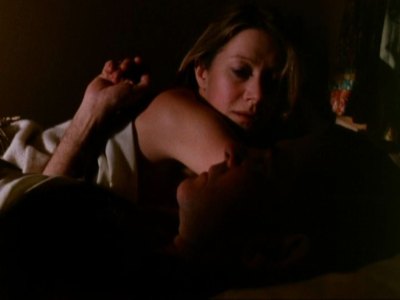
"Helen Mirren and Ian Holm star in this Stephen Poliakoff production about two people who find themselves exiles in their own way. Alexei Varyov (Holm) is a Soviet journalist who is paranoid of the British Home Office, certain that there is a conspiracy against him. However, he bumps into and can't help being drawn to Celia Watson (Mirren) and is soon whisked into an unforgettable world of Sussex parties and society weddings, meeting all sorts of eccentric people along the way." - Liner notes.
Perhaps my favorite adaptation here in the Helen Mirren at the BBC boxed set, Soft Targets is a marvelously sensual and tricky little "nobodydunit" that totally pulls you into its soft, deceptive rhythms, all the while convincing you're seeing something that winds up as total fantasy. Ostensibly an espionage yarn without the espionage, Stephen Poliakoff's story conjures up all the necessary ingredients for a rainy Sunday afternoon amalgamation of the dreary, anti-heroic spy shenanigans of The Spy Who Came in From the Cold, and the standard art-house romance between lost souls (creating an atmosphere not unlike the later Half Moon Street) - which is then shred away in an instant to reveal...nothingness. All of the red herrings on the part of Holm's resigned, paranoid Alexei were carefully set up to reveal...nothing. There is no espionage. No plot. No threats. No subterfuge. Nothing. He's not even important enough to have a tail put on him.
His "romance" with Mirren is equally specious. Assuming she's involved with the plot, her disappearance can only mean one thing to the essentially self-centered Alexei: she's been dragged into the "plot" to discredit him. But when it turns out that Celia, a simple cocktail waitress, tried to commit suicide, the stunned Alexei realizes he's been living in a total fantasy world of his own choosing. A relatively unimportant Russian writer, working in London and sending tapes back of English television for his bored superiors, Alexei doesn't even know that his articles stopped being published months ago. Celia, rightfully so, is kind and polite to Alexei, but she's in her own world, dealing with her own problems. There will be no romance. Holm and Mirren are terrific together, particularly Holm who effortlessly limns the quirky, inquisitive Russian writer who hasn't the faintest idea what his real worth is to the BHO. An irresistible "rug puller" for audience expectations, Soft Targets is quite fascinating.
The DVD:
The Video:
All of the video transfers for the Helen Mirren at the BBC boxed set are standard 1.33:1 (as they were originally broadcast), with most of the titles shot originally on video (the last three: Blue Remembered Hills, Mrs. Reinhardt, and Soft Targets were shot on film, owing to the general change in policy with British TV switching over to mostly filmed material for improved picture quality). As for the actual transfers, they're about what you'd expect for video masters from over thirty years ago. Grain and a level of video noise do affect the often times soft pictures, as do some light flaring and faded or muted colors. But overall, considering the obscurity of most of these titles, the transfers look okay considering the original source materials.
The Audio:
All of the films in the Helen Mirren at the BBC collection are presented in their original English mono tracks. And for what they are, the dialogue is usually crisp and clear. Optional English subtitles are available - and recommended when the accents get a little thick.
The Extras:
Only two extras grace this Helen Mirren at the BBC boxed set. First, on disc one, there's a newly filmed interview, Helen Mirren Remembers, specifically produced for this set, where she briefly discusses the films in this collection. It runs 27:24. On the second disc, BBC talk show host Michael Parkinson interviews Helen Mirren from 1975; it's a nervous little interview (Parkinson can't keep his eyes off Mirren's breasts), but valuable for seeing the star early in her career. It runs 14:56.
Final Thoughts:
Fans of the supremely talented Helen Mirren will not want to pass up the Helen Mirren at the BBC boxed set, which features nine interesting, fascinating (and a few failed) forays into televised theatrics from her early TV career. Fans of British theatre and TV in general might want to take a look, as well. I highly recommend Helen Mirren at the BBC.
Paul Mavis is an internationally published film and television historian, a member of the Online Film Critics Society, and the author of The Espionage Filmography.


|
| Popular Reviews |
| Sponsored Links |
|
|
| Sponsored Links |
|
|
| Release List | Reviews | Shop | Newsletter | Forum | DVD Giveaways | Blu-Ray | Advertise |
|
Copyright 2024 DVDTalk.com All Rights Reserved. Legal Info, Privacy Policy, Terms of Use,
Manage Preferences,
Your Privacy Choices | |||||||














